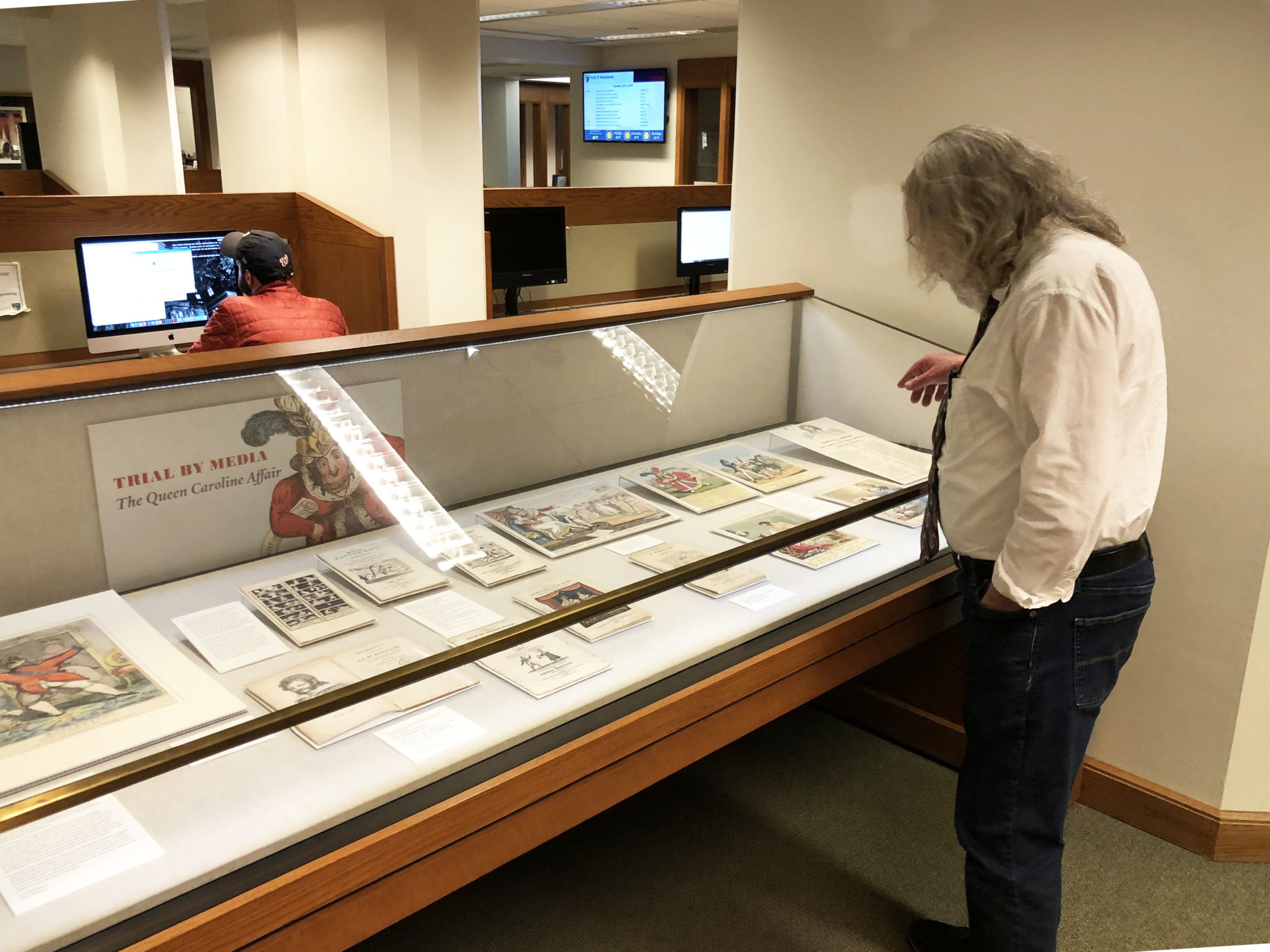
Samuel Turner
After the death of his father, King George IV — reluctant to share the throne — put Queen Consort Caroline on trial under charges of adultery. Rare book librarian Mike Widener from the Lillian Goldman Law Library and curator Cynthia Roman from the Lewis Walpole Library are commemorating the bicentennial of the trial in a collaborative exhibit, “Trial by Media: the Queen Caroline Affair.”
The exhibit, which is on display from Sept. 9 to Dec. 19 in the Law Library’s Rare Book Exhibition Gallery, combines the Law Library’s trial texts with the Lewis Walpole Library’s vast collection of satirical prints in Farmington, Connecticut. The items in the exhibit — from satirical cartoons to legal accounts — offer scholars an insight into the state of legal and media affairs in 19th-century Britain. Among the nearly 50 titles from the Law Library and several more from the Lewis Walpole Library, Roman’s favorite is a “very rare” shop album from the print publisher George Humphrey.
On Oct. 4, Widener and Roman hosted a mini conference in connection with the exhibit that featured two panels on the legal and media implications of the trial. While viewers can currently visit the exhibit in person or online in a Flickr album, a comprehensive online version with several essays is expected for publication by the end of 2019.
“I like acquiring puzzles not for me to figure out but for students, researchers and faculty,” Widener said. “I look at this exhibit as bait to get people interested if they’re looking for interesting projects.”
This collaboration blossomed out of a blog post written by Widener that Roman saw. It is the first exhibit in what the pair hopes to be a budding relationship between libraries.
“Our collections are focused on 18th-century England and all of its influence, but this was a natural collaboration with the Law School since we have wider interests in the history of law, politics, culture and media,” Roman said. “We are continuing to buy related material that offers more sympathetic representations to go side-by-side with the satirical prints and Mike’s legal pamphlets.”
The exhibit offered a chance for the Lewis Walpole Library to acquire some 19th-century works that will interest scholars.
According to Widener, the trial offers a window into early legal developments.
“The trial was a surrogate for bigger issues of political reform, the franchise and how people and the parliament are elected,” Widener said. “The trial became a stand-in for issues such as freedom of the press.”
Henry Brougham, who represented Queen Caroline and later became the Lord Chancellor, offered an expansive view of a lawyer’s duty to his or her client, Widener said.
Brougham even suggested that his duty to client trumped his allegiance to the monarchy.
“Some in the legal profession today may say Broughman’s declaration is going too far, but it’s an important enunciation of a lawyer’s duty to his client,” Widener said. “Even if people might say that’s too far, it’s part of the history of that principle.”
The trial left other important legacies too. It resulted in an evidentiary common-law principle — called the Rule in Queen Caroline’s case — that prevented the presentation of surprise evidence, Widener added.
This exhibit also sheds light on the enormous media presence during the Queen Caroline affair and characterizes it as one of the first real media events, according to Widener.
Records indicate that George IV became the first English monarch visibly recognizable by the English public due to the proliferation of pamphlets, one of which was produced nearly 500,000 times according to some estimates.
Law students and undergraduates alike praised the exhibit in interviews with the News.
“The satirical prints in the exhibit are very interesting and remind me of political cartoons today,” Patrick Feeley ’22 said. “The British support for Queen Caroline in 1820 also demonstrates that a King’s slander is no more important than the public’s opinion.”
The Lewis Walpole Library plans to continue to acquire material related to the Queen Caroline trial, according to Roman, and the two libraries hope to collaborate again together in the future. Until then, Widener is working on an exhibit for the spring on annotations in law books.
Although the bill alleging Caroline’s adulteries never passed in the House of Commons, Queen Caroline — turned away from coronation — passed away the following year from illness.
Samuel Turner | samuel.turner@yale.edu







